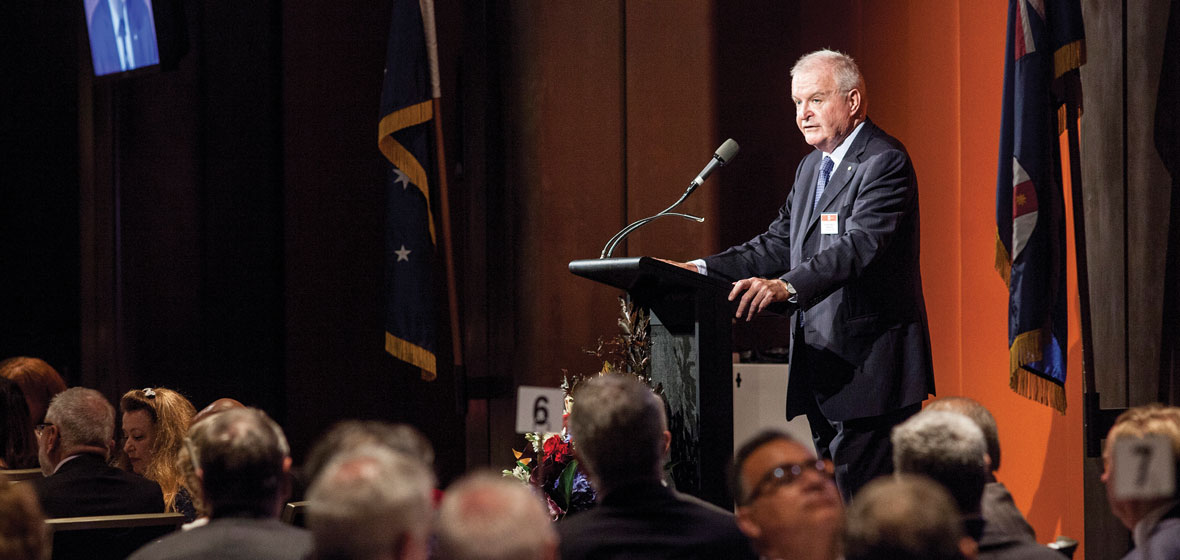The Opening of Law Term Dinner held at Parliament House on 1 February 2017, highlighted how it is the responsibility of all lawyers to ensure those from culturally and linguistically diverse backgrounds have equal access to the law.
In 1888, the NSW Government ordered the police force to prevent Chinese passengers disembarking from a ship which had arrived in Sydney Harbour. Following an application of habeus corpus by one passenger, Lo Pak, the Supreme Court found that the detention of the passengers was illegal.
Following the court’s decision, the then Premier, Sir Henry Parkes, dismissed the decision as “technical”. He stated, in inflammatory language that we are perhaps not unfamiliar with today, “There is one law which overrides all others, and that is the law of preserving the peace and welfare of civil society. Would you talk about a technical observance of the law if a plague was stalking in our midst – if a pestilence was sweeping off our population – if a famine was reducing the members of our households to skeletons?”
The government maintained this defiance of the rule of law for a considerable period of time, leading Chief Justice Darley to admonish the government’s actions as unprecedented and in flagrant disregard of the law. Eventually, the government conceded and released the detainees.
As stated by my predecessor, Jim Spigelman, it should give us pause that one of the most serious threats to the rule of law in Australia was grounded in xenophobia. However, this story also demonstrates the role of the judiciary and the profession in promoting equality, fairness and the rule of law, in spite of popular sentiment.
Judicial officers are required by oath to “do right to all manner of people … without fear or favour, affection or ill-will”. This precept reflects the fundamental goal of the legal system to give equal access and protection to “all manner of people”, regardless of race, ethnicity, language, socio-economic status, political opinion, gender or sexual orientation.
For most of you, the importance of equal access to justice is axiomatic.
Almost one-third of Australians were born overseas, the highest proportion in 120 years. While the vast majority of migrants come from the UK and New Zealand, in the past 10 years, the number of Australians born in non-English speaking countries has increased.
In NSW, 23 per cent of the population speak a language other than English at home and 19 per cent were born in a non-main English speaking country. Throughout Australia, 11 per cent of Aboriginal and Torres Strait Islander peoples speak an Australian Indigenous language at home.
The diversity of our community means that for us to achieve equal justice, the courts and the profession must consider the unique needs of different sections of the community. Reiterating a famous Aristotelian phrase, the High Court has stated that equality before the law “requires, so far as the law permits, that like cases be treated alike … [and], where the law permits, differential treatment of persons according to differences between them …” In this sense, equal justice requires us to develop procedures and practices to accommodate cultural or linguistic differences that may hinder effective participation in the legal system.
Ten years ago, in his state of the judicature address, Sir Gerard Brennan said that “to maintain the rule of law in a free and confident nation”, the judiciary must meet four requirements. First, it must be and be seen to be impartial and independent. Second, it must be competent and knowledgeable of the law and its purpose, including accepting and observing limitations on judicial power and, within those limits, “developing the law to answer the needs of society from time to time”. Third, it must have “the confidence of the people”. Fourth, it must be “reasonably accessible to those who have a genuine need for its remedies”.
These four requirements are as relevant now as they were one decade ago. They can all be connected to the need for an inclusive justice system. One aspect of impartiality is that the judiciary possess knowledge of the unique ways in which people might be disadvantaged by court processes and procedures within the existing legal framework. In regard to the second, part of developing the law to answer the needs of society includes responding to the diversity of our population by developing accommodating and inclusive procedures. Third, gaining public confidence requires “all manner of people” to have confidence that they will be able to utilise the legal system. And the final requirement speaks for itself – like all people, culturally and linguistically diverse Australians, as well as Aboriginal and Torres Strait Islander peoples, have a genuine need for the protection of the law and must be provided with reasonable access to it.
People have been having difficulty understanding court processes and procedures for many years. In Bleak House, Dickens described the litigation process as “such an infernal country-dance of costs and fees and nonsense and corruption as was never dreamed of in the wildest visions of a Witch’s Sabbath.” While I don’t believe Dickens’ scenes of corruption and inefficiency apply to any Australian courts today, I do acknowledge that the law can be incredibly confusing to non-lawyers – and even to many lawyers.
We can be needlessly wordy at times. Arthur Symonds once said that if you wished to give another person all right and title to an orange, instead of saying “I give you that orange”, you would have to say, “I give you all and singular, my estate and interest, right, title, claim and advantage of and in that orange, with all its rind, skin, juice, pulp and pips, and all right and advantage therein, with full power to bite, cut, suck, and otherwise eat the same, or give the same away as fully and effectually as I the said A.B. am now entitled to bite, cut, suck, or otherwise eat the same orange, or give the same away, with or without its rind, skin, juice, pulp, and pips, anything hereinbefore, or hereinafter, or in any other deed, or deeds, instrument or instruments of what nature or kind soever, to the contrary in any wise, not-withstanding.” Of course, a lawyer in Sydney might ask whether the conveyor had transferred the right to make an orange infused latte to be served in a re-purposed jam jar in Surry Hills.
Jokes aside, it is certainly worrying that in one survey conducted by the Australia Institute, 88 per cent of respondents agreed with the statement that “the legal system is too complicated to understand properly”.
Culturally and linguistically diverse parties and witnesses are often at a distinct disadvantage in understanding court processes and procedures, which may be very different to those in their country of origin. Further, the stress of participating in court proceedings is magnified where the justice system is unfamiliar and events occur in a non-native language. People with limited English language skills are at a distinct disadvantage when understanding forms, court paperwork, communicating with court staff, participating in court proceedings and understanding court orders.
Multicultural diversity continues to be a defining feature of modern Australia and one that we can be proud of. The 2016 Scanlon Foundation’s Mapping Social Cohesion report found that an overwhelming majority of Australians, 83 per cent, believed that multiculturalism is good for the country. A clear majority also believed that immigration levels were either “about right” or “too low”. These numbers provide the best indication that Australia is a country committed to diversity and inclusivity.
However, there are also findings in the report that should give us pause. There has been an increase in people reporting discrimination, with the highest levels of discrimination reported by people from non-English speaking backgrounds. As a profession, we must work together to give a voice to those who are marginalised in order to ascertain what barriers they face in fully participating in our legal system.




